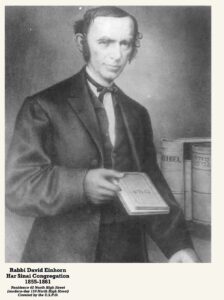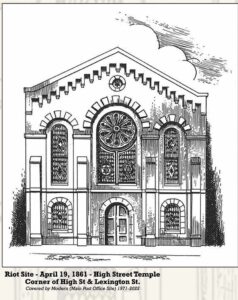Rabbi Einhorn used the above Biblical quote [Deut. 24:22] in his sermons


Rabbi David Einhorn was a Jewish resident in Baltimore during the Pratt Street Riots of April 19′”, 1861. Born on November 10″, 1809 in Dispeck, Bavaria, Einhorn pursued his education in rabbinical studies in Fuerth, Bavaria, but took an interest in Reform Judaism, which did not follow as many laws as the more conservative Orthodox Judaism. Immigrating to Maryland in 1847, he became part of the Baltimore based synagogue named Har Sinai, and openly preached his disdain for antisemitic and anti immigrant party called the “Know Nothings.” In “The Bible View of Slavery,” Einhorn argued that the institution of slavery did not follow the Bible, that bondage was not supposed to last for life, slaves were not required to work on the sabbath, and slaves who ran from their masters were not meant to be returned. He also cited the reason that the biblical justification for slavery was rooted in outmoded practices, such as polygamy, and was opposite of God’s “favor of freedom, kindness, and human dignity.” Rabbi Einhorn would specify that “God created man in His image. This blessing of God ranks higher than the curse of Noah. A book which sets up this principle and at the same time says that all human beings are descended from the same human parents, can never approve of slavery.” Einhorn’s position would create many enemies in Baltimore, for simply relating the struggle of the Jewish people with African Americans.
The rivalrv between Rabbi Einhorn and Rabbi Raphall displays the national divide that slavery brought to the young nation, as these two Jewish men had profoundly differing views on the cruel institution. Raphall insisted that the bible could not be interpreted as an abolitionist text, and that enslaving African Americans was not sinful. Many Rabbis, including Einhorn. disagreed with Raphall’s views. Slavery of blacks was so fundamental to causing the Civil War, that Jewish immigrant Rabbis were arguing over biblical passages to determine either the legitimacy or Illegitimacy or slavery.

As he preached his anti-slavery rhetoric, Baltimore’s political tensions only worsened with the secession of the South, resulting in the Pratt Street Riots. The riots would result in the destruction of the place where his newsletter, Sinai, was printed, and he received death threats outside his home. Einhorn was undeterred, and it would not be until three days after the riot that he decided to leave Baltimore for the safety of his family. Sinai would no longer be printed eighteen months later, and Rabbi Einhorn would continue preaching against barriers that barred Jewish chaplains from the military. He would never return to Baltimore; he would spend five years in Philadelphia and then move to New York in 1866 to preach until his death in 1879.